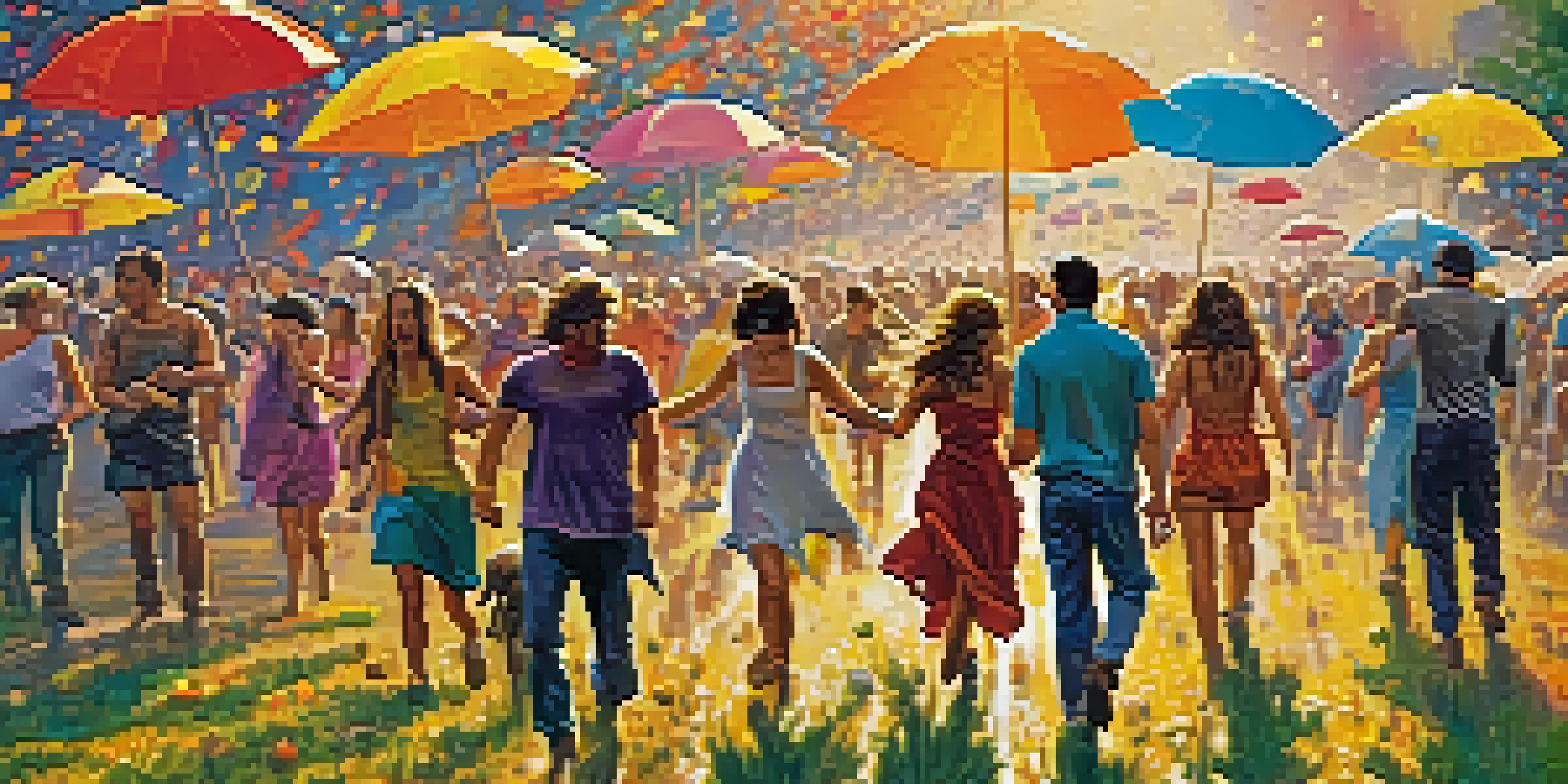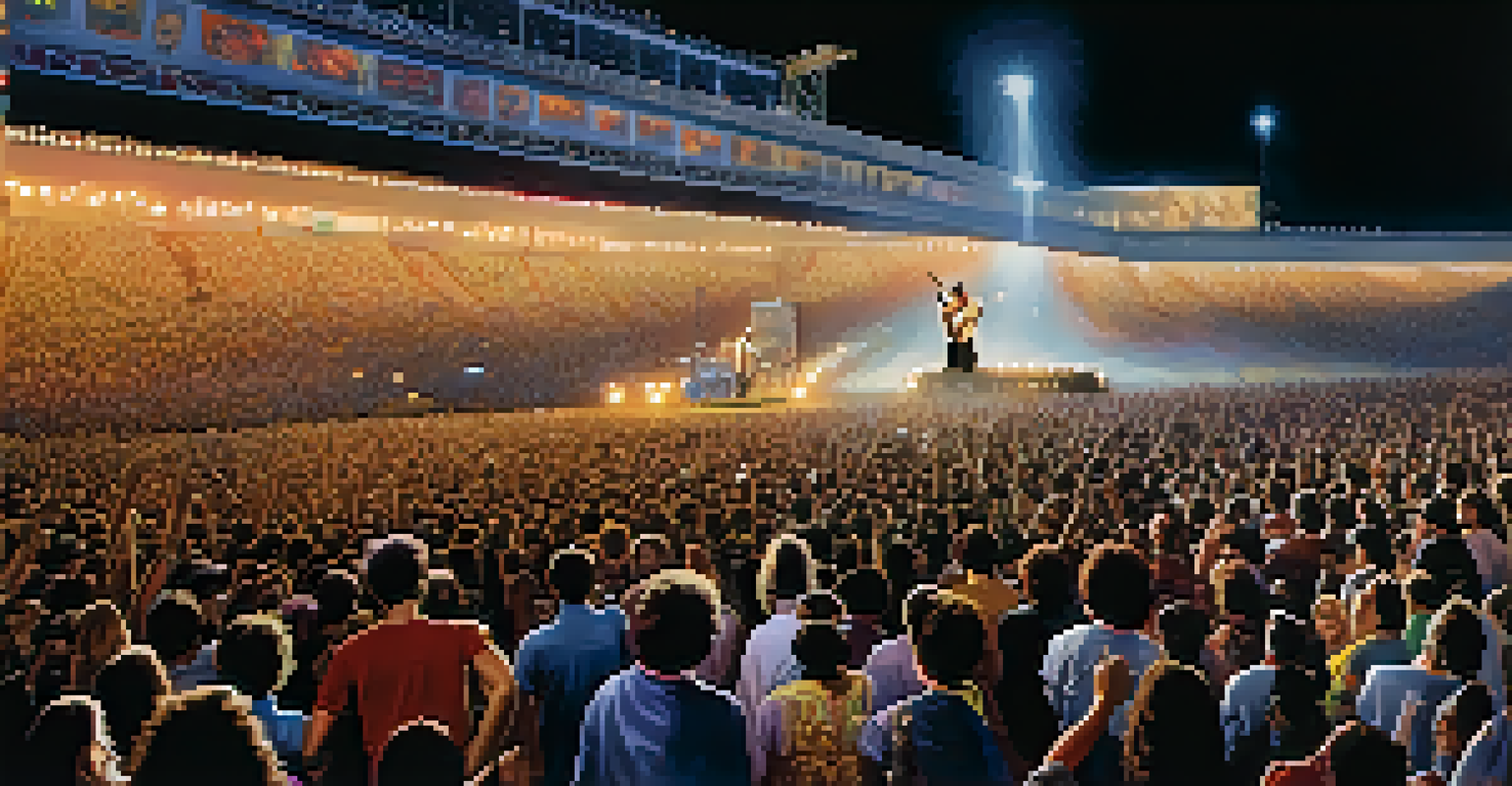Woodstock: The Festival That Changed Music Forever

The Birth of Woodstock: A Vision for Peace and Music
In the summer of 1969, a group of music lovers aimed to create a festival that celebrated peace, love, and music. This vision materialized in the form of the iconic Woodstock Festival, held in Bethel, New York. Led by organizers like Michael Lang and Artie Kornfeld, the event was intended as a ‘Aquarian Exposition’ to showcase the counterculture movement of the time.
Music can change the world because it can change people.
The festival was conceived as a place where people could gather, free from societal constraints, uniting under the banner of rock and roll. It was a bold response to the political turmoil and social unrest of the late 1960s, including the Vietnam War. As the festival began to take shape, its significance quickly evolved into something far beyond a mere concert.
Woodstock not only aimed to entertain but also to inspire a generation to advocate for peace and social change. The event's tagline, ‘Three Days of Peace & Music,’ perfectly encapsulated its essence, resonating with thousands who sought a refuge from a tumultuous world.
The Lineup: Legends and Rising Stars Unite
Woodstock boasted a lineup that reads like a who’s who of music history, featuring legendary acts like Jimi Hendrix, Janis Joplin, and The Who. These iconic performances would become landmarks in music history, showcasing the raw talent and spirit of the 1960s. The diverse lineup not only catered to rock fans but also included folk, blues, and even jazz, reflecting the eclectic nature of the era.

As attendees flowed into the festival, they were greeted by an unforgettable array of performances that pushed boundaries and fostered a sense of unity. For many artists, performing at Woodstock was not just an opportunity; it was a defining moment that elevated their careers to new heights. The emotional intensity of these performances created an atmosphere that would be etched into the memories of those who attended.
Woodstock: A Festival for Peace
The Woodstock Festival symbolized a powerful movement advocating for peace, love, and music amidst the social upheaval of the 1960s.
The music at Woodstock transcended entertainment; it became anthems of hope and resistance. Songs like ‘The Star-Spangled Banner’ by Jimi Hendrix transformed into powerful statements against the backdrop of war, leaving audiences in awe and igniting a cultural shift.
The Experience: A Tapestry of Love and Community
Attending Woodstock was more than just listening to music; it was about experiencing a communal spirit that brought people together as one. Despite the chaotic logistics and unexpected rain, attendees found solace in shared ideals and human connection. The festival became a melting pot of creativity, collaboration, and camaraderie, with strangers bonding over their love for music.
The power of music makes all the difference.
The atmosphere was electric, filled with vibrant art, impromptu performances, and moments of genuine kindness. People shared food, resources, and shelter, embodying the festival's ethos of peace and love. This sense of community was palpable, creating bonds that many would carry long after the final note played.
Woodstock proved that music could unite individuals from all walks of life, transcending social barriers and fostering a sense of belonging. It was a testament to the power of culture in healing and connecting people during turbulent times.
Challenges Faced: Chaos and Resilience
While Woodstock is often romanticized, it faced significant challenges that tested the resilience of both organizers and attendees. Overwhelming crowds, food shortages, and adverse weather conditions posed logistical nightmares. What was intended to be a festival for 50,000 quickly ballooned to over 400,000, leading to a chaotic but ultimately memorable experience.
The rain turned the festival grounds into a muddy landscape, creating both struggles and camaraderie among festival-goers. Despite the discomfort, many embraced the situation, dancing in the rain and celebrating the moment. This resilience became a hallmark of the Woodstock spirit, showcasing the unwavering determination to enjoy the festival despite obstacles.
Cultural Impact and Legacy
Woodstock revolutionized the music festival landscape and continues to inspire generations through its ideals of unity and artistic expression.
These challenges highlighted the importance of adaptability and resourcefulness in the face of adversity. The shared struggle ultimately bonded festival-goers, making the experience even more meaningful as they navigated the chaos together.
Cultural Impact: Shaping the Music Industry
Woodstock fundamentally changed the landscape of the music industry, influencing how festivals are planned and experienced. It set the standard for large-scale music events, paving the way for future festivals around the globe. The concept of a music festival as a transformative experience became ingrained in popular culture, inspiring countless iterations in the decades that followed.
Moreover, Woodstock served as a launchpad for many artists who went on to become household names. The exposure gained from performing at the festival propelled careers, allowing artists to connect with a larger audience. This shift not only altered individual careers but also the way music was marketed and consumed.
The festival's legacy continues to resonate, with many artists today citing Woodstock as a pivotal influence on their work. It symbolizes a moment in history where music became a vehicle for change, reflecting the aspirations and struggles of a generation.
The Iconic Documentaries: Capturing a Movement
The legacy of Woodstock was immortalized through documentaries that captured the essence of the festival and its impact on society. The most notable is the 1970 film simply titled ‘Woodstock,’ which showcased the performances and the spirit of the festival. This documentary not only served as a visual archive but also played a crucial role in solidifying Woodstock's place in music history.
Through powerful imagery and evocative storytelling, the film highlighted the festival's significance, making it accessible to those who couldn't attend. It became a cultural touchstone, inspiring future generations to explore the ideals of peace and love encapsulated within the festival.
Challenges and Resilience
Despite facing significant challenges, Woodstock attendees showcased remarkable resilience, turning chaos into a memorable shared experience.
These documentaries continue to influence filmmakers and music enthusiasts alike, reminding us of the power of storytelling in preserving cultural heritage. They serve as a window into a transformative moment, allowing us to reflect on how music can shape and unite communities.
Woodstock's Legacy: A Continuing Influence
Even decades later, the spirit of Woodstock remains alive and well, influencing music and culture worldwide. The festival inspired similar events, including Coachella and Glastonbury, which continue the tradition of celebrating music and community. These festivals carry forward the values of love, peace, and artistic expression that Woodstock epitomized.
Moreover, Woodstock's ideals have permeated various aspects of society, from environmental movements to social justice causes. The festival's message of unity resonates in contemporary struggles, reminding us that music can be a powerful force for change.

As we look back on Woodstock, it serves as a reminder of how music can bridge divides and inspire action. Its legacy encourages us to embrace creativity, compassion, and connection in our own lives, ensuring that its impact endures for generations to come.